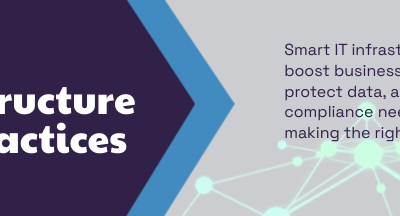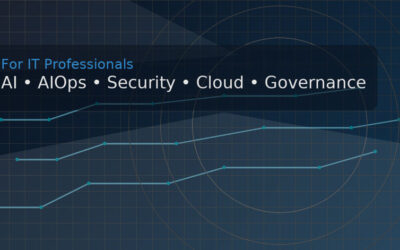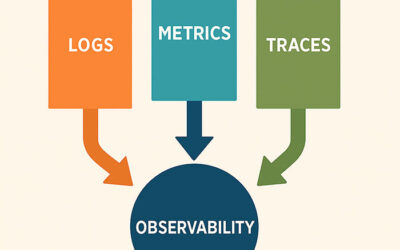The Evolution of DevOps in Modern IT
DevOps has transformed from a niche methodology into a fundamental practice in IT, bridging the gap between development and operations. In 2025, DevOps is no longer optional—it’s a core competency that IT professionals must master to stay competitive in an evolving digital landscape.
As companies race toward automation, cloud computing, and AI-driven operations, DevOps offers a framework to enhance agility, improve efficiency, and ensure rapid software delivery.
Why DevOps is Crucial in 2025
1. Accelerated Software Delivery
With businesses relying on rapid deployment cycles, DevOps practices like continuous integration (CI) and continuous deployment (CD) ensure that code changes are released faster, with fewer errors.
2. Increased Automation & AI Integration
AI-driven DevOps, or AIOps, is gaining traction, enabling self-healing systems, predictive analytics, and intelligent automation, reducing human intervention while enhancing reliability.
3. Security at the Forefront
With DevSecOps, security is integrated throughout the development process rather than being an afterthought. IT professionals who master security automation and compliance will be in high demand.
4. Cloud & Hybrid Infrastructure Dominance
As organizations transition to multi-cloud and hybrid environments, DevOps plays a critical role in infrastructure as code (IaC), cloud orchestration, and containerization.
5. High-Paying Job Opportunities
According to reports, DevOps engineers are among the highest-paid IT professionals, making it a lucrative skill set for career growth.
Essential DevOps Tools and Technologies in 2025
To stay ahead, IT professionals need proficiency in key DevOps tools:
| Category | Popular Tools |
| Version Control | Git, GitHub, GitLab, Bitbucket |
| CI/CD | Jenkins, GitHub Actions, GitLab CI/CD, CircleCI |
| Configuration Management | Ansible, Puppet, Chef |
| Containerization | Docker, Kubernetes, OpenShift |
| Monitoring & Logging | Prometheus, Grafana, ELK Stack, Splunk |
| Cloud & IaC | AWS CloudFormation, Terraform, Azure DevOps, Google Cloud Build |
How IT Professionals Can Master DevOps
- Get Hands-On Experience: Build personal DevOps projects, deploy applications using Kubernetes, or set up a CI/CD pipeline.
- Earn Certifications: AWS DevOps Engineer, Google Professional DevOps Engineer, and Kubernetes certifications can boost your credibility.
- Stay Updated: Follow DevOps trends and best practices through blogs, webinars, and community forums.
- Master Cloud Technologies: Understanding cloud platforms like AWS, Azure, and Google Cloud is essential.
- Develop a Security Mindset: Learn about DevSecOps to integrate security into DevOps pipelines.
How DevOps is Revolutionizing IT Workflows
DevOps has become a game-changer in IT, redefining how teams develop, deploy, and maintain software. As organizations push for more agility, automation, and efficiency, DevOps acts as the glue between development and operations, ensuring seamless collaboration and continuous improvement.
By breaking down silos between traditionally separate IT teams, DevOps fosters a culture of shared responsibility, rapid iteration, and frequent releases—all while maintaining stability and security. Let’s explore the key ways DevOps is shaping IT workflows.
1. Continuous Integration and Continuous Deployment (CI/CD)
One of the biggest advantages of DevOps is its emphasis on Continuous Integration (CI) and Continuous Deployment (CD). These practices automate the software development lifecycle, allowing IT teams to push code updates multiple times a day rather than following long release cycles.
- CI (Continuous Integration): Developers frequently merge their code into a shared repository, where automated tests validate the changes before integration.
- CD (Continuous Deployment): Once code passes all tests, it is automatically deployed to production without manual intervention.
This automated pipeline reduces deployment risks, minimizes downtime, and accelerates time-to-market. Companies like Netflix, Amazon, and Google rely on CI/CD to push updates and fixes in real time.
2. Infrastructure as Code (IaC): A DevOps Powerhouse
Gone are the days of manually configuring servers. With Infrastructure as Code (IaC), IT professionals can define infrastructure using machine-readable files, making deployments repeatable, scalable, and consistent.
Popular IaC tools include:
- Terraform: A widely used open-source tool for automating cloud infrastructure.
- AWS CloudFormation: A service that allows AWS users to model and provision cloud resources.
- Ansible & Puppet: Configuration management tools that automate system administration tasks.
By treating infrastructure like software, organizations can ensure that their development and production environments are always in sync—eliminating the dreaded “it works on my machine” problem.
3. Containerization & Orchestration: The Rise of Kubernetes
Modern DevOps revolves around containers—lightweight, portable environments that encapsulate applications and their dependencies. Containers ensure that applications run consistently across different environments, from a developer’s laptop to production servers.
Docker revolutionized containerization, but Kubernetes (K8s) has taken it to the next level by orchestrating containerized applications at scale. Kubernetes automates:
- Container deployment
- Load balancing
- Self-healing applications
- Scaling based on traffic
As more organizations adopt cloud-native architectures, Kubernetes has become an essential DevOps skill. Companies that fail to embrace containerization risk falling behind in efficiency, scalability, and cost savings.
4. DevSecOps: Security in the DevOps Pipeline
Cybersecurity threats are growing, and DevOps teams can no longer afford to treat security as an afterthought. Enter DevSecOps, which integrates security at every stage of the development lifecycle.
Key aspects of DevSecOps include:
- Automated security scans in CI/CD pipelines
- Code analysis for vulnerabilities
- Real-time monitoring & incident response
- Role-based access control (RBAC) for cloud and infrastructure security
By implementing DevSecOps, organizations reduce risk exposure while maintaining the speed and agility that DevOps provides.
5. Monitoring & Observability: Keeping Systems Reliable
A core principle of DevOps is continuous monitoring, ensuring that systems are running optimally at all times. With the rise of distributed cloud architectures, having real-time observability is non-negotiable.
Top monitoring & logging tools:
- Prometheus & Grafana – Open-source solutions for real-time monitoring.
- Elasticsearch, Logstash, Kibana (ELK Stack) – A powerful logging and analytics suite.
- Splunk – An enterprise-grade monitoring and security tool.
With real-time observability, IT teams can predict failures before they occur, optimize performance, and troubleshoot production issues faster.
The Business Impact of DevOps
DevOps isn’t just an IT trend—it’s a strategic business advantage. Companies that successfully implement DevOps practices experience:
- 50% faster time-to-market for new features and products.
- Lower infrastructure costs due to automation and efficient resource utilization.
- Higher software reliability with reduced downtime and incidents.
- Stronger collaboration between development, operations, and security teams.
According to industry reports, organizations that adopt DevOps see a 20% increase in revenue growth compared to competitors who don’t. This competitive edge makes mastering DevOps an invaluable skill for IT professionals.
How IT Professionals Can Upskill in DevOps
As demand for DevOps expertise continues to grow, IT professionals must invest in continuous learning and hands-on experience. Here’s how to build a strong DevOps skillset in 2025:
1. Learn Key DevOps Tools
Hands-on experience with essential DevOps tools is a must. Start with:
- Version Control: Git, GitHub, GitLab
- CI/CD Pipelines: Jenkins, GitHub Actions, GitLab CI/CD
- Containerization: Docker, Kubernetes
- Infrastructure Automation: Terraform, Ansible
- Monitoring & Logging: Prometheus, ELK Stack
Many cloud providers offer free-tier access to experiment with DevOps tools.
2. Get Certified
Certifications can help validate expertise and increase job prospects. Top DevOps certifications include:
- AWS Certified DevOps Engineer
- Google Professional DevOps Engineer
- Certified Kubernetes Administrator (CKA)
- Microsoft Certified: Azure DevOps Engineer Expert
3. Build Real-World Projects
Reading about DevOps isn’t enough—build and deploy real projects. Try:
- Setting up a CI/CD pipeline for a web application.
- Deploying a Kubernetes cluster on AWS or Google Cloud.
- Automating infrastructure with Terraform.
4. Follow DevOps Trends & Communities
Stay ahead by engaging with the DevOps community:
- Read blogs & listen to podcasts (e.g., DevOps.com, The New Stack).
- Join forums & Slack groups (e.g., DevOps Subreddit, DevOps Slack).
- Attend DevOps conferences like KubeCon and AWS re:Invent.
The Cultural Shift Behind DevOps Success
While DevOps is often associated with tools and automation, its true power lies in cultural transformation. Organizations that successfully adopt DevOps don’t just implement CI/CD pipelines or containerized applications—they foster a mindset of collaboration, ownership, and continuous improvement.
1. Breaking Down Silos Between Development and Operations
Traditional IT environments are plagued by silos. Developers write code, throw it over the wall to operations, and move on to the next task. Meanwhile, operations teams struggle to deploy and maintain software they didn’t build, leading to delays, inefficiencies, and frustration on both sides.
DevOps removes these barriers, encouraging developers and operations to work together from the beginning of the software lifecycle. Teams that adopt DevOps principles:
- Communicate openly through shared dashboards and reporting.
- Participate in cross-functional team meetings to align goals.
- Take joint responsibility for software stability, security, and performance.
Companies like Google and Spotify have demonstrated that cross-functional collaboration leads to faster development cycles, fewer incidents, and more satisfied IT teams.
2. The Role of Leadership in DevOps Adoption
DevOps adoption isn’t just an engineering initiative—it requires strong leadership support. Many companies struggle to implement DevOps at scale because of resistance to change. Leadership plays a crucial role in:
- Creating a DevOps-friendly culture by promoting experimentation and reducing the fear of failure.
- Investing in training programs to upskill IT teams in automation, CI/CD, and security best practices.
- Setting clear goals and KPIs to measure the success of DevOps initiatives.
Tech leaders who actively advocate for DevOps adoption—rather than just approving budget requests—create organizations that thrive on innovation and agility.
DevOps in Large Enterprises vs. Startups
The approach to DevOps varies depending on the size and structure of an organization. Startups and large enterprises face unique challenges and advantages when implementing DevOps practices.
DevOps in Startups: Moving Fast and Breaking Things
Startups operate in a highly agile environment, making DevOps a natural fit. Since they don’t have legacy systems or rigid corporate structures, they can:
- Automate everything from day one – Startups can integrate CI/CD, cloud-native solutions, and microservices architecture without disrupting existing workflows.
- Experiment with cutting-edge technologies – Small teams can rapidly test new DevOps tools, containerization strategies, and observability solutions.
- Quickly iterate and pivot – Without bureaucratic overhead, startups can ship updates in hours instead of weeks.
However, the challenge for startups is scalability. As they grow, they need to ensure their DevOps processes remain efficient without introducing chaos.
DevOps in Large Enterprises: Overcoming Complexity
Large enterprises often have legacy infrastructure, strict compliance requirements, and multiple teams with varying skill levels. This makes DevOps adoption more challenging but also more rewarding.
Enterprises can implement DevOps successfully by:
- Gradual adoption – Instead of a complete overhaul, large companies can start with small pilot projects before expanding DevOps company-wide.
- Hybrid cloud strategies – Since many enterprises can’t abandon on-premises infrastructure, they leverage hybrid and multi-cloud approaches for DevOps scalability.
- Security & compliance automation – With regulatory requirements in industries like finance and healthcare, DevOps teams integrate policy-as-code and automated compliance checks.
Enterprises like Amazon, Facebook, and Capital One have demonstrated that, when executed properly, DevOps leads to faster innovation and reduced operational costs at scale.
DevOps Beyond IT: How It’s Changing Business Operations
DevOps principles—automation, agility, and collaboration—aren’t limited to software development. Organizations are applying DevOps methodologies beyond IT, transforming various business operations.
1. DevOps for Marketing: Continuous Campaign Deployment
Marketing teams are adopting Agile and DevOps-like approaches to rapidly test and deploy digital campaigns. Instead of launching a single massive campaign and hoping for success, they:
- Use A/B testing and real-time analytics to continuously optimize messaging.
- Automate email marketing and social media scheduling with CI/CD-like tools.
- Create data-driven feedback loops to iterate marketing strategies.
2. DevOps in HR: Streamlining Recruitment & Employee Onboarding
HR teams are leveraging automation and data-driven approaches to:
- Automate resume screening with AI-driven applicant tracking systems.
- Use data analytics to predict employee retention and productivity.
- Implement self-service onboarding portals, reducing manual HR processes.
3. DevOps in Finance: Automating Risk Management & Fraud Detection
Finance departments use real-time monitoring and automation to detect fraud, assess risk, and enhance security. By leveraging DevOps practices, they:
- Implement automated risk assessment models to detect anomalies in transactions.
- Use AI-driven analytics to prevent cyber fraud.
- Deploy real-time financial dashboards for decision-making.
These examples highlight that DevOps is more than just an IT function—it’s a methodology that improves efficiency across entire organizations.
The Future of DevOps: What to Expect in the Next 5 Years
As technology continues evolving, DevOps is set to undergo significant changes. IT professionals who anticipate these shifts will be in high demand.
1. NoOps: The Future of Automated IT Operations
NoOps (No Operations) is an emerging concept where AI and automation completely manage IT infrastructure, reducing the need for human intervention. Key trends include:
- Self-healing systems that detect and fix issues autonomously.
- AI-driven deployment orchestration that predicts failures before they happen.
- Automated incident response that eliminates the need for manual troubleshooting.
While NoOps won’t eliminate IT jobs, it will shift roles toward higher-level strategic decision-making.
2. Edge Computing & DevOps
With the rise of 5G, IoT, and smart devices, DevOps will expand into Edge Computing—where processing happens closer to users instead of centralized data centers.
- Real-time DevOps pipelines will be needed to update and manage software across millions of connected devices.
- Security at the edge will become a critical focus area.
- Decentralized monitoring and observability will be key to maintaining performance across edge networks.
3. Low-Code/No-Code DevOps
As businesses demand faster software development, Low-Code/No-Code platforms will integrate with DevOps, enabling:
- Citizen developers (non-technical users) to build applications.
- Automated testing and deployment for low-code platforms.
- Faster software delivery without traditional coding requirements.
This democratization of development will blur the lines between developers, operations, and business users.
4. Blockchain & DevOps Integration
Blockchain technology is becoming more relevant in DevOps, particularly for:
- Immutable CI/CD logs to prevent tampering.
- Decentralized security protocols for cloud and hybrid environments.
- Smart contracts for automated infrastructure provisioning.
Companies investing in blockchain-powered DevOps solutions will gain enhanced security and transparency.
Trends to Watch
1. AI and Machine Learning in DevOps
AIOps is revolutionizing how organizations handle monitoring, automation, and system troubleshooting.
2. GitOps: The Next Big Thing
GitOps is streamlining deployments by using Git as the source of truth for infrastructure and application management.
3. Low-Code/No-Code DevOps
With businesses demanding faster development, DevOps is integrating with low-code platforms to automate software delivery even further.
4. Serverless Computing
DevOps professionals are shifting towards serverless architectures, reducing infrastructure management overhead and enhancing scalability.







